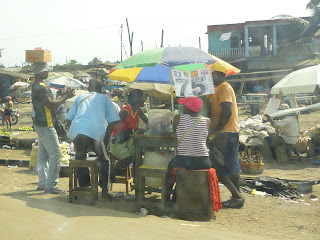As usual the country delights and frustrates at the same time and as we left people are speculating about whether the revolutions in the north Africa will spread further south and spell the end of the 28-year rule of President Paul Biya. The Government is nervous and putting out messages saying "why would anyone protest in a country as well run as this?". Zero out of ten for self-awareness there - the country's potential is not being realised and lack of good leadership is largely responsible.
At the family level we have our issues too. Dad has envisioned and started many projects but, especially at his age, needs more help than he has been getting recently. I'm optimistic that we are starting to change that. Again there is real potential and hopefully over the next year our major property development in Kribi will start and the nearby conference centre business will get on its feet. We also have work to do on the internet front to get the site for Dad's foundation, Global Health Dialogue, running properly and to help him develop another webpage on the regulation of medical training, which remains an active area for him. A new farm in the village and the successful reclaim through the courts of our palm tree plantation (ownership claimed by our tenant) are in process too. Oil exploration is also going on in the village which could change its rural tranquility and have Dad swap his chief's cap for a JR Ewing 10 gallon hat! It should be an interesting next year before we visit again.
Discretion prevents me commenting on some of the family politics that have been getting in the way of these projects, but suffice to say that life there is never dull. As my sister Silo said, we need to find a good publisher for the book. We have added some pictures to the blog entries and here is an album of additional photos of the places and people we met in Cameroon.
 |
| Cameroon top 30 |















